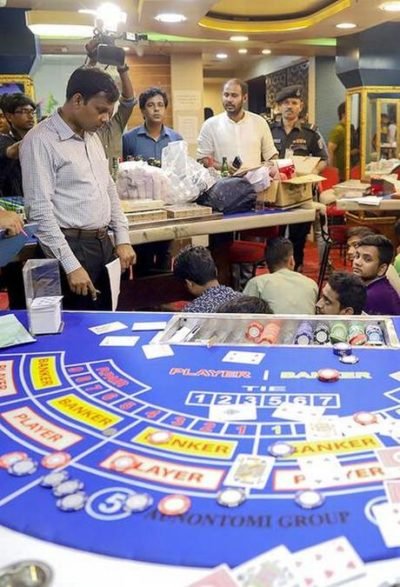Published in The Hindu on Sunday 6 October 2019
Hasina’s crusade against corruption
The Bangladesh PM has launched a drive which she says is necessary to address rising inequality

On a muggy September afternoon, roulette players crowded into a sporting club in Dhaka just like another day. Croupiers spun the roulette wheels, but the players were clearly out of luck. The Rapid Action Battalion, known as an elite force, descended on the club, not far from the local police station, and arrested 142 people in a major anti-gambling sweep. With this raid ongoing, a separate team arrested the man behind the gambling ring in another part of the city on September 18 — Khaled Mahmud Bhuiyan, an organising secretary of the ruling Awami League’s youth front Jubo League.
As the day wore on, security forces raided three more clubs that operated slot machines, roulette tables and other gambling equipment in Dhaka, an unlikely place for casinos. The raids offered, for the first time, glimpses into mushrooming clandestine casinos established by people with close ties to the ruling party.
“It was necessary to strike a blow against this corrupt part of our society,” Prime Minister Sheikh Hasina said. “We’re continuing the drive against corruption to prevent the recurrence of incidents such as 1/11,” Ms. Hasina said at a news conference in New York on September 29, alluding to the controversial intervention in the civil administration by an Army-led group in 2007. Her comments shed light on the involvement of Jubo League leaders in running illicit gambling facilities. “I brought it upon myself to right the wrong.”
In another startling raid on September 20, the RAB arrested Golam Kibria Shamim, an influential government-listed contractor who identifies himself as a Jubo League leader, along with his seven bodyguards. Shamim made headlines for his clout over the government’s Public Works Department to secure contracts. The man who used his bodyguards and loud car honks to clear his way through Dhaka traffic was seen in handcuffs in a quick reversal of fortune. His company dealt with at least 22 construction contracts worth around 60 billion taka (₹50 billion). The arrest has now stalled those projects, according to the local media.
Contracts gone wrong
During the raid on his business, law-enforcement officials seized about 20 million taka in cash, 1.75 billion taka worth of savings in fixed deposits, alcohol and firearms from his office. Shamim was initially remanded for 10 days in two separate cases: firearms and money laundering. After the first round of interrogation, the police took him back into custody for another nine days, securing a new court order.
His case exposes footprints of corruption in government contracts often secured through bribery and political muscle. Bangladesh went down six steps to the 149th position on the Transparency International’s (TI) latest Corruption Perception Index — the second worst performance after Afghanistan among the eight South Asian nations.
By one estimate, 2-3% of Bangladesh’s GDP is lost to corruption. But TI estimates the losses at 5% of the GDP if large public procurements and corruption in health and education sectors are taken into account.
“When money is transferred from one pocket to another, it may not be directly linked to loss of economic growth. But when a bridge or a building collapses due to poor construction, then it is not only a waste of money and loss of potential output of the economy but also a loss of invaluable human lives,” Fahmida Khatun, executive director of the Dhaka-based Centre for Policy Dialogue, wrote in a recent report.
As the crackdown on corruption set off ripples of anxiety, student protests erupted at a university in the district of Gopalganj, about 100 km from the capital, against Vice-Chancellor Khondoker Md Nasiruddin. The teacher who faced a barrage of allegations — from irregularities in student admission and appointment of teachers to corruption in procurement — resigned on September 30.
Ms. Hasina said the anti-corruption drive was necessary to bring equality in society. Inequality in Bangladesh has reached an all-time high. The country’s Gini coefficient, a statistical measure of income inequality, increased to 0.482 in 2016 from 0.458 in 2010. “The nouveau riche creates disparity in society, leaving the children of honest people frustrated. Children are innocent; therefore, they ask their parents — ‘if they can come to school in expensive cars and wear expensive clothes, then why can’t we?’” Ms. Hasina said. There’s a moral hazard associated with corruption.
Ms. Khatun sums it up: “If corruption continues to go unchecked, many get encouraged; others get frustrated and demotivated.”
(Arun Devnath is a journalist based in Dhaka)


